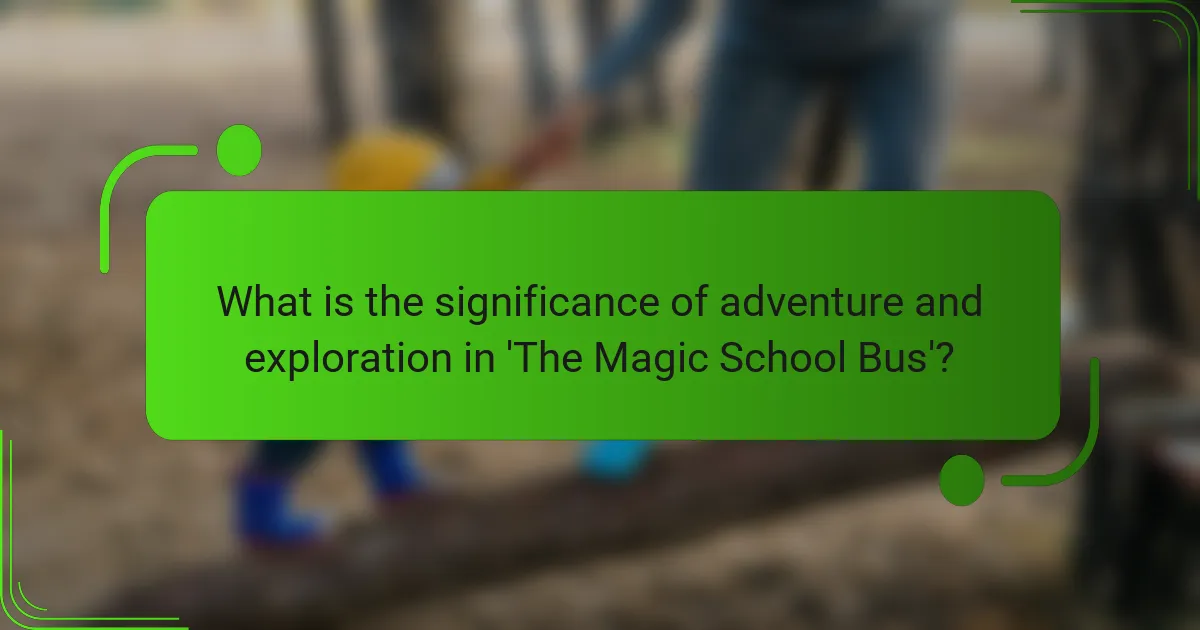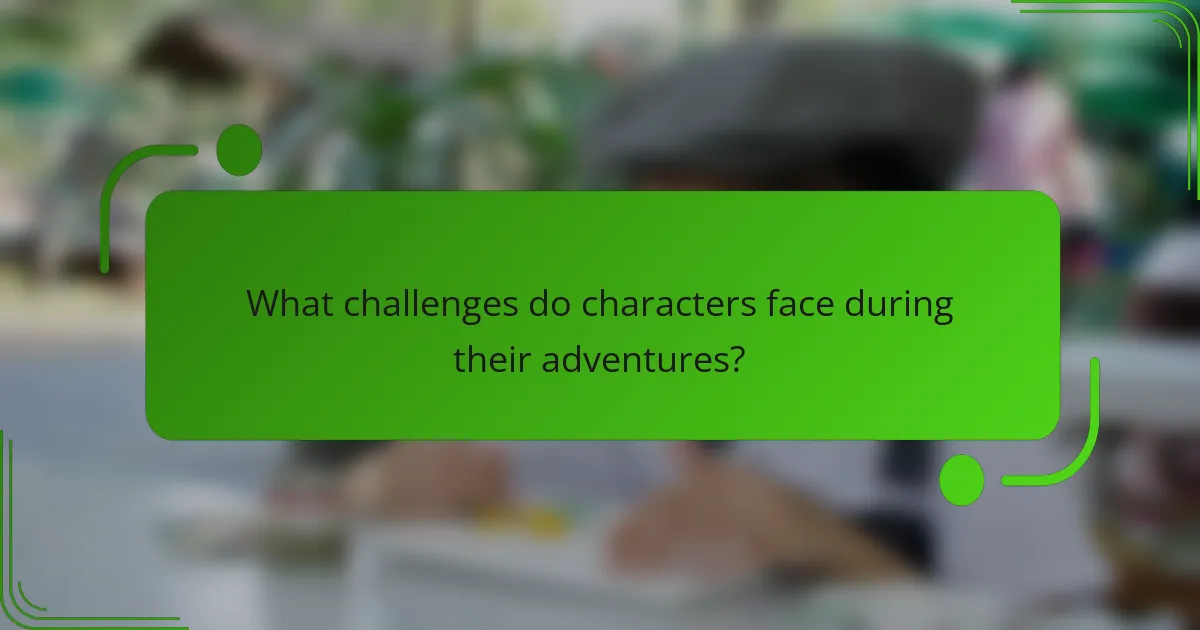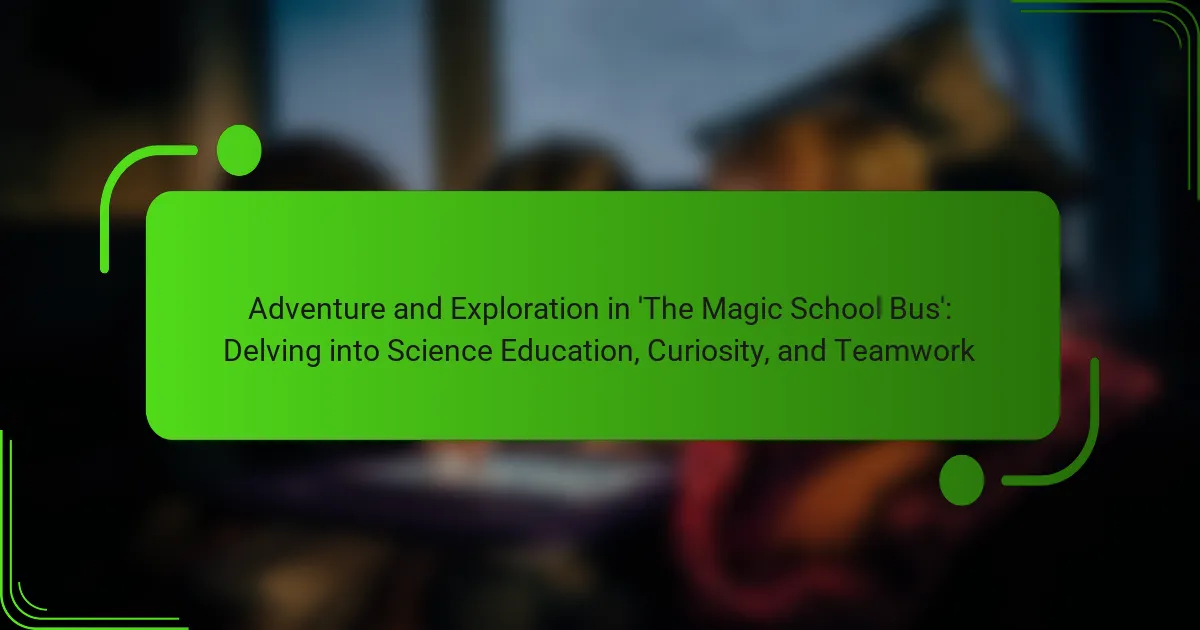‘The Magic School Bus’ is an educational animated series that enhances science education through adventure and exploration. The show features Ms. Frizzle and her class embarking on imaginative field trips that simplify complex scientific concepts, making them accessible and engaging for children. Each episode promotes teamwork, problem-solving, and critical thinking as characters face challenges and navigate unfamiliar environments. Research indicates that the series effectively fosters curiosity and improves students’ understanding of science, highlighting its role as a valuable educational tool in promoting science literacy. Overall, the series emphasizes the joy of discovery and collaboration in learning.

What is the significance of adventure and exploration in ‘The Magic School Bus’?
Adventure and exploration in ‘The Magic School Bus’ are significant for enhancing science education and fostering curiosity. The show uses imaginative field trips to teach scientific concepts. Each adventure provides a hands-on learning experience. This approach engages students and makes complex topics accessible. Exploration promotes teamwork among the characters. It encourages problem-solving and critical thinking. The series emphasizes the joy of discovery. Overall, these elements make learning enjoyable and memorable for young audiences.
How does ‘The Magic School Bus’ incorporate science education into its adventures?
‘The Magic School Bus’ incorporates science education through engaging storylines and hands-on learning experiences. Each episode features Ms. Frizzle leading her students on field trips that explore various scientific concepts. The adventures often involve shrinking to microscopic sizes or traveling through time. This immersive approach allows viewers to visualize complex topics like biology, physics, and chemistry. The show uses humor and creativity to maintain interest while teaching. Educational content is aligned with school curricula, making it relevant for students. The series encourages curiosity and teamwork among characters, reinforcing collaborative learning. Through these methods, ‘The Magic School Bus’ effectively promotes science education.
What scientific concepts are explored through the episodes?
The episodes of ‘The Magic School Bus’ explore various scientific concepts. These include biology, chemistry, physics, and earth science. For instance, the series delves into the human body, ecosystems, and chemical reactions. Each episode presents scientific principles through engaging adventures. The show effectively illustrates complex ideas in a child-friendly manner. It promotes curiosity and teamwork as students collaborate on experiments. The educational content aligns with scientific standards for children’s learning. Overall, the series serves as a valuable resource for introducing foundational science concepts.
How do the adventures enhance understanding of these concepts?
The adventures in ‘The Magic School Bus’ enhance understanding of science concepts through immersive experiences. Each adventure places students in real-world scientific scenarios. This hands-on approach fosters curiosity and engagement. Students learn through exploration, observation, and experimentation. For example, a journey inside the human body illustrates biological functions vividly. Such experiences reinforce theoretical knowledge with practical application. Research shows that experiential learning improves retention of information. Therefore, the adventures effectively bridge the gap between abstract concepts and tangible understanding.
Why is curiosity a central theme in ‘The Magic School Bus’?
Curiosity is a central theme in ‘The Magic School Bus’ because it drives the characters to explore and learn about science. The show’s premise revolves around Ms. Frizzle, who encourages her students to ask questions and seek answers. Each episode features adventures that spark curiosity about natural phenomena and scientific concepts. This approach fosters a love for learning and discovery among viewers. The series effectively demonstrates how curiosity leads to knowledge and understanding. By engaging with complex topics in an entertaining way, it promotes critical thinking and inquiry. The interactive nature of the show invites children to participate in the learning process, reinforcing the value of curiosity in education.
How do the characters demonstrate curiosity during their journeys?
The characters in ‘The Magic School Bus’ demonstrate curiosity through their eagerness to explore new environments. They ask questions about the scientific phenomena they encounter during their adventures. For instance, when traveling inside a human body, they inquire about how different organs function. Their curiosity drives them to conduct experiments and seek answers to complex scientific concepts. Additionally, they often express wonder at the discoveries they make, which encourages further exploration. This inquisitive nature not only enhances their learning but also fosters teamwork as they collaborate to solve problems. Their curiosity is a key element that propels the narrative forward and engages young viewers in science education.
What role does curiosity play in fostering a love for science?
Curiosity is essential in fostering a love for science. It drives individuals to ask questions and seek answers. This intrinsic motivation leads to exploration and experimentation. Studies show that curious learners engage more deeply with scientific concepts. They are more likely to pursue STEM careers. Curiosity enhances critical thinking and problem-solving skills. Research indicates that curiosity can improve retention of scientific knowledge. Overall, curiosity lays the foundation for a lifelong passion for science.
How does teamwork contribute to the adventures in ‘The Magic School Bus’?
Teamwork is essential in ‘The Magic School Bus’ as it enhances problem-solving and fosters collaboration among students. Each adventure requires the students to work together to overcome challenges. For example, when exploring the human body, they rely on each other’s strengths and knowledge. This collaboration leads to innovative solutions and deeper understanding of scientific concepts. The series emphasizes that collective effort leads to success in their explorations. Teamwork also builds social skills and encourages communication among the students. Overall, teamwork is a key element that drives the narrative and educational outcomes in the series.
What examples of teamwork are showcased in the series?
The series “The Magic School Bus” showcases several examples of teamwork among the students and Ms. Frizzle. One example is when the students collaborate to solve scientific problems during their field trips. They often divide tasks based on individual strengths, such as one student conducting experiments while others gather data. Another instance is when they work together to navigate challenges, like fixing the bus or overcoming obstacles in their adventures. The teamwork displayed emphasizes communication and cooperation, as they discuss ideas and strategies to achieve their goals. This collaborative spirit reinforces the importance of working together in learning and exploration.
How does teamwork enhance problem-solving in scientific contexts?
Teamwork enhances problem-solving in scientific contexts by pooling diverse skills and perspectives. Collaborative efforts allow for the sharing of knowledge and expertise. This leads to more innovative solutions to complex problems. Research shows that teams can generate more creative ideas than individuals working alone. A study published in the Journal of Applied Psychology found that teamwork improves performance by 20-25% in problem-solving tasks. Additionally, teamwork fosters communication and trust, which are essential for effective collaboration. Enhanced problem-solving through teamwork is evident in various scientific fields, including research and development. Overall, teamwork is a critical component in advancing scientific inquiry and discovery.
What are the connections between adventure and learning outcomes in ‘The Magic School Bus’?
Adventure in ‘The Magic School Bus’ directly enhances learning outcomes by engaging students in active exploration. The show uses imaginative field trips to teach scientific concepts. These adventures stimulate curiosity and encourage critical thinking. Students learn through hands-on experiences that make complex topics accessible. The narrative format promotes retention of knowledge. For example, episodes covering ecosystems or the human body illustrate practical applications of science. This approach fosters teamwork and collaboration among characters, reinforcing social learning. Overall, adventure serves as a catalyst for educational engagement and comprehension.
How do the show’s adventures promote engagement in science education?
The show’s adventures promote engagement in science education by making complex concepts accessible and entertaining. Each episode features relatable characters who embark on scientific explorations. These adventures illustrate real-world applications of scientific principles. The interactive format encourages viewers to ask questions and think critically. Engaging storylines spark curiosity and foster a love for learning. Research shows that children learn better when they are emotionally invested. The show’s use of humor and creativity keeps young audiences captivated. This combination effectively enhances understanding and retention of scientific knowledge.

What challenges do characters face during their adventures?
Characters face various challenges during their adventures in “The Magic School Bus.” These challenges include navigating complex scientific concepts. They often encounter unexpected obstacles that require problem-solving skills. Characters must work together to overcome difficulties, showcasing teamwork. Additionally, they face time constraints that add urgency to their missions. Misunderstandings about science can lead to mistakes, requiring quick thinking. Characters also deal with fears and uncertainties in unfamiliar environments. Each challenge serves to teach valuable lessons about science and collaboration. The adventures highlight the importance of curiosity and resilience in learning.
How do these challenges relate to real-world scientific problems?
Challenges in “The Magic School Bus” relate to real-world scientific problems by illustrating complex concepts in an engaging way. These challenges often mirror issues such as environmental science, biology, and physics. For example, episodes may address pollution, ecosystems, or the human body. By facing these challenges, characters demonstrate problem-solving skills applicable to real-world scenarios. This approach helps students understand the relevance of science in everyday life. Research shows that experiential learning enhances comprehension of scientific principles. Engaging narratives increase student motivation and curiosity about science. Thus, the challenges serve as a bridge between theoretical knowledge and practical application.
What skills do characters develop while overcoming these challenges?
Characters develop problem-solving skills while overcoming challenges. They learn to analyze situations and devise effective solutions. Critical thinking is enhanced as they evaluate information and make decisions. Collaboration skills improve through teamwork, fostering communication and cooperation. Resilience is built as they face setbacks and persist toward their goals. Adaptability is cultivated when they adjust to new environments and unexpected obstacles. Creativity is sparked as they brainstorm innovative ideas to tackle problems. These skills are essential for navigating both academic and real-world challenges.
How does overcoming challenges enhance the educational value of the series?
Overcoming challenges enhances the educational value of the series by promoting critical thinking and problem-solving skills. Characters in ‘The Magic School Bus’ face obstacles that require them to analyze situations. This analysis encourages viewers to think creatively about solutions. Additionally, overcoming these challenges fosters resilience and perseverance. Students learn the importance of persistence when faced with difficulties. The series also illustrates teamwork as characters collaborate to overcome obstacles. This collaboration teaches the value of communication and cooperation in learning. Overall, these elements contribute to a deeper understanding of scientific concepts and real-world applications.
What lessons can viewers learn from the characters’ adventures?
Viewers can learn about the importance of curiosity and teamwork from the characters’ adventures. The characters consistently demonstrate that asking questions leads to discovery. Their explorations emphasize the value of scientific inquiry. Teamwork is essential as they solve problems together. Each adventure showcases how diverse perspectives enhance understanding. Collaboration fosters creativity and innovation in overcoming challenges. The characters’ experiences teach resilience in facing obstacles. Overall, the series highlights that learning is a collective journey.
How do these lessons translate into real-life applications of science?
Lessons from “The Magic School Bus” translate into real-life applications of science by fostering curiosity and teamwork. These lessons encourage students to explore scientific concepts actively. For example, experiments with ecosystems in the show promote understanding of environmental science. Engaging in hands-on activities helps students grasp complex topics. Real-world applications include increased interest in STEM careers. Collaborative projects mirror scientific research teamwork. This approach enhances critical thinking and problem-solving skills. Studies show that experiential learning boosts retention of scientific knowledge.
What values are promoted through the characters’ experiences?
The characters’ experiences in ‘The Magic School Bus’ promote values of curiosity, teamwork, and resilience. Curiosity is emphasized as characters explore scientific concepts and ask questions. Teamwork is highlighted through collaborative problem-solving during adventures. Resilience is demonstrated when characters face challenges and learn from mistakes. These experiences encourage viewers to embrace learning and work together. The series illustrates how curiosity leads to discovery and understanding. Teamwork fosters a sense of community and support among peers. Resilience teaches the importance of perseverance in the face of difficulties. These values are essential for personal growth and effective learning.

What impact has ‘The Magic School Bus’ had on science education?
‘The Magic School Bus’ has significantly influenced science education by making complex concepts accessible and engaging for children. The series uses imaginative storytelling to introduce scientific principles. Each episode features Ms. Frizzle leading her class on educational adventures. These adventures demonstrate real-world applications of science. Research indicates that such engaging content enhances student interest in science. Studies show that children who watch the series display improved understanding of scientific concepts. The show’s interactive format encourages curiosity and fosters teamwork among students. Overall, ‘The Magic School Bus’ serves as a valuable educational tool in promoting science literacy.
How has the show influenced children’s interest in science?
The show has significantly influenced children’s interest in science. It introduces complex scientific concepts through engaging storytelling. The characters embark on adventures that demonstrate real-world applications of science. This approach makes learning enjoyable and relatable for young viewers. Research indicates that children exposed to educational programs like this show show increased curiosity about scientific topics. A study published in the Journal of Educational Psychology found that children who watched ‘The Magic School Bus’ scored higher in science-related assessments. This evidence supports the show’s effectiveness in fostering scientific interest and understanding among children.
What feedback have educators provided regarding the show’s effectiveness?
Educators have provided positive feedback regarding the effectiveness of “The Magic School Bus.” They note that the show successfully engages students in science concepts. Many teachers report improved student interest in science after watching the series. The show’s interactive format encourages curiosity and teamwork among students. Educators appreciate the way it simplifies complex topics. They also highlight the show’s ability to promote critical thinking skills. Research indicates that students retain information better when learning is fun. Overall, feedback reflects that the series enhances science education effectively.
How has the series contributed to the development of science curricula?
The series has significantly influenced the development of science curricula by integrating engaging storytelling with scientific concepts. It presents complex topics in a relatable manner, making science accessible to young learners. The show’s format encourages curiosity and exploration, essential components of effective science education. Research indicates that multimedia resources like this series enhance student engagement and retention of scientific knowledge. Studies show that children who engage with educational programs exhibit improved understanding of scientific principles. The incorporation of hands-on experiments in the episodes aligns with modern educational standards that emphasize experiential learning. Thus, ‘The Magic School Bus’ serves as a valuable tool in shaping contemporary science curricula.
What are some tips for parents to enhance their children’s learning through ‘The Magic School Bus’?
Engage children with interactive discussions about each episode of ‘The Magic School Bus.’ Ask open-ended questions to stimulate critical thinking. Encourage them to share what they learned and how it relates to real-life situations. Use related books and activities to reinforce concepts presented in the show. Incorporate hands-on experiments that mirror the adventures on the bus. This practical application enhances understanding and retention. Additionally, utilize online resources and games related to the series to further enrich their learning experience. Creating a fun and educational environment will foster a love for science and exploration.
How can parents encourage curiosity and exploration at home?
Parents can encourage curiosity and exploration at home by creating a stimulating environment. They can provide access to diverse books and educational materials. Engaging children in hands-on activities fosters exploration. Parents should ask open-ended questions to spark critical thinking. Encouraging outdoor play enhances natural curiosity. Setting up science experiments at home can inspire interest in learning. Allowing children to pursue their interests promotes independent exploration. Research shows that children who explore their environment develop better problem-solving skills.
What activities can complement the show’s scientific themes?
Hands-on experiments can complement the show’s scientific themes. Activities like building simple circuits enhance understanding of electricity. Creating plant growth observations ties into lessons on biology. Conducting water filtration experiments illustrates principles of environmental science. Group discussions about scientific concepts foster teamwork and critical thinking. Field trips to science museums provide real-world context for learning. Interactive online simulations can deepen engagement with scientific principles. These activities reinforce the educational content presented in the show.
The main entity of the article is ‘The Magic School Bus,’ a children’s educational series that emphasizes adventure and exploration as key components of science education. The article examines how the show enhances learning through imaginative field trips that engage curiosity, teamwork, and critical thinking. It discusses the scientific concepts explored in episodes, the role of curiosity in fostering a love for science, and the importance of teamwork in problem-solving. Additionally, the article highlights the impact of the series on children’s interest in science and offers tips for parents to support their children’s learning at home.
